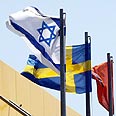
Kingdom of hatred
Anti-Israel sentiments have been rife in Sweden even before controversial tabloid report
There is no need for a blood libel like the one published by Aftonbladet to realize they don’t like us in Sweden. In the country that likes to present itself as equal and neutral, Israel is considered the greatest nemesis of our time.
It is difficult to find media reports that show at least the required neutrality of a news report. For example, stories about terror attacks during the Intifada did not always note the perpetrator was a suicide bomber, but rather, that “four Israelis and a Palestinians were killed in an explosion,” as if the poor Palestinian just happened to be at the scene of the blast.
When we did find a report about Israeli victims, it was immediately complemented by a long item about Palestinians whose house was razed. In those reports it was clear who deserves the sympathy, and it wasn’t us.
Why is it happening? At times this is indeed about legitimate political criticism, yet in other cases political criticism is merely a veneer for classic anti-Semitism. The Jewish community in Sweden is small and barely speaks up in defense of Israel, while the Israeli presence in the country is minimal.
On the other hand, there are many Muslim immigrants in the country. The result is hatred for Israel, which in many cases is felt by people fed by the anti-Israeli media and Palestinian propaganda.
And this hatred is easily felt: In some stores, the fact that fruits and vegetables on offer arrived from Israel is not noted, for fear they will be damaged on the shelves. Meanwhile, wine produced in the Golan Heights and sold in the national alcoholic beverage chain faced a consumer boycott. In the Israeli embassy in Stockholm, hate mail and hateful phone calls are routine.
In such atmosphere, it is not surprising to encounter anti-Israel incidents. The Israeli ambassador had shoes hurled at him at a lecture he delivered; elsewhere, during the Second Lebanon War, protestors blocked the entrance to the embassy and poured red paint at the site, while in central Stockholm we saw a rally where demonstrators openly carried Hezbollah flags; yet nobody protested.
A few years in Sweden teach you something about unpopularity. I met some charming and friendly people, but no fewer people whose smile froze and handshake withered the moment I said where I was from. “You should be ashamed for what you do to the Palestinians,” one man castigated me after we were introduced. “You’re like the Nazis,” said someone else.
Perhaps people whose relatives never stayed at extermination camps, but rather, lived peaceful lives during the most terrible period faced by the Jewish people can’t understand the difference between genocide and a war between two countries. I wish for them to never learn this difference, but to at least try to understand us.










